Procedural Notes on the Motion to Vacate
I have no idea what's going to happen; but here's how it will happen
The big news this week is that Representative Gaetz is strongly signaling that he will formally try to depose Speaker McCarthy this week in the House. Whether he will succeed is a complicated political question with a lot of unknowns and a pretty big game tree. What we can confidently say is what the procedural dynamics are going to look like, and where the key political choices will be made. I’ll go through the procedural steps below, and then offer some tentative thoughts about the politics below.
Let’s start from the beginning. A motion to vacate the Office of the Speaker would be brought in the form of a resolution. If the resolution was introduced in the normal manner, it would simply be referred to the Committee on Rules, as H.Res. 385 was when Meadows introduced it in 2015 in his threat to bring down Speaker Boehner.
If the resolution was offered from the floor as a Question of Privilege, it would be eligible for immediate consideration.1 Indeed, a Question of Privilege is one of the few ways an individual Member can unilaterally bring something to the floor. It’s how Representative Green forced Trump impeachment resolutions ((H.Res. 646 and H.Res. 705, 115th Congress) onto the floor in 2017 and then again 2018. And it’s how Representative Jordan forced a resolution for the impeachment of the IRS commissioner onto the floor in December 2016:2
When a member offers a Question of Privilege, it is guaranteed immediate consideration only if offered by the majority leader or minority leader. For anyone else, the Chair can defer consideration for up to 2 legislative days. Here’s Rule IX, Clause 2(a)(1) of the Rules of the 118th House of Representatives.
So in most cases, the first step in moving a resolution via a Question of Privilege is formally noticing the intent to do so. Here’s Garcia noticing his intent to offer his Santos expulsion resolution as a Question of Privilege:
When consideration does occur during the next two legislative days, the Chair first determines if the resolution constitutes a question of privilege. The Chair might entertain debate over this, but will eventually make a ruling. The ruling can be appealed.
If the Chair rules the resolution constitutes a Question of Privilege (Gaetz’s resolution will constitue a QoP, it’s a cut and dry case), consideration takes place under the Hour Rule in the House. Prior to recognizing Gaetz for debate under the Hour Rule, opponents will have options to try to dispose of the resolution.
Prior to recognizing Gaetz for debate under the Hour Rule, opponents will have options to try to dispose of the resolution. The fastest way to dispose of it would be to move to table the resolution. The motion to table in the House is non-debatable, and thus would receive an immediate vote. A successful motion to table would kill the resolution and end consideration.3 This is the fate of most Questions of Privilege.
Another option would be a motion to refer the resolution to a committee. This motion is debatable, so the Member moving it would need to successfully move the previous question before they could get a vote on the motion to refer.
Both the motion to refer and motion to table could be tried; the motion to table has precedence, but neither excludes the possibility of the other. Members could also demand the yeas and nays and get record votes on these motions. It’s also possible to make a motion to postpone consideration of a Question of Privilege.
If none of these methods of disposal are successful, debate would begin on the resolution, under the hour rule, with time equally divided between the proponent of the resolution (Gaetz) and either the majority or minority leader, or their designee, as determined by the Chair.
At the end of the hour, the proponent of the resolution could move the previous question on the resolution in order to cut off further debate and, if successful, would setup a final vote on the resolution, subject to standard motions still available after the Previous Question is ordered (motion to commit, motion to adjourn).
If the resolution was adopted by the House, the Speakership would immediately be vacant, which would trigger Rule I, clause 8(a)(3)(A), putting a Speaker pro tempore into place until an intervening Speakership election. Who is the top name on the list that McCarthy gave to the Clerk? We don’t know!
Note that this process does not immediately trigger an election for a new Speaker. A motion to proceed to the election of a Speaker is privileged, but if the House were to reject it, they could take up other business with the Speaker pro tempore presiding.4
In all likelihood, the House would immediately proceed to the business of electing a new Speaker. But the important point is that vacating the Speakership mid-Congress does not return us to the state of nature situation at the outset of a new Congress, when the Speaker election takes place prior to the existence of House rules and prior to the existence of sworn-in Members.
Ok. That’s the procedures. Here are some quick thoughts about the politics.
McCarthy has a short-term numbers problem, but so does Gaetz. It’s true that the balance of power in the House is very narrow right now. There are currently 221 Republicans and 212 Democrats (there are vacancies in RI-1 (Ciccilinie’s former seat) and UT-2 (Stewart)). That' means that any 5 Republicans can deny McCarthy a majority on procedural votes by voting against him, and indeed that is what we have seen happen on several rules resolutions over the past weeks/months. But Gaetz has an equally challenging math problem, in that he needs to make sure that virtually the entire Democratic caucus continues to reflexively vote against McCarthy on procedural issues. But Gaetz has an equally challenging math problem, in that he needs to make sure that virtually the entire Democratic caucus continues to reflexively vote against McCarthy on procedural issues. If 10 Republicans vote to vacate the Speakership (meaning 211 voted to sustain McCarthy, it only takes 6 Democratic votes to give McCarthy a majority. Even more to the point, it would only take 12 Democrats choosing to not vote (or to vote “present”) to give McCarthy a 211-210 victory using only Republican votes.
Gaetz knows this, and probably doesn’t care. It’s sometimes hard to pin down the political goals of Gaetz and the Freedom Caucus crowd. They don’t seem particularly interested in policy; often their efforts result in policy moving to the left, like last week when they blocked a CR with cuts to non-defense discretionary spending below the FY23 level, just to see a CR pass with spending at the FY23 level. Most of what they seem to want is some combination of (1) attention, from their constituencies, conservative media, and the DC press; and (2) separation from the Republican leadership, such that they can label themselves pure conservatives and the leadership DC sellouts. From this point of view, forcing McCarthy to sustain himself by using Democratic votes is almost an idea result for Gaetz.
Sustaining his Speakership with Democratic votes on a motion to vacate doesn’t really solve McCarthy’s political and procedural problem. In the modern house—that is, for the last 150 years—leaders operate by having a durable procedural majority that mostly defers to them on agenda setting. It’s just very hard to run the House effectively without one.5 You have to take votes on rules every week, and that is implicitly a recurring motion to vacate. As much as we make a big deal out of the motion to vacate, Gaetz and company could force the same issue repeatedly by just refusing to vote for any McCarthy special rule that gets put on the floor.
Consequently, while the Democrats can obviously save McCarthy from a motion to vacate in the short term, they can't really fix the underlying problem. It seems exceedingly unlikely---basically impossible---for McCarthy to create a durable bipartisan procedural coalition, and even if he tried that would require completely adjusting his policy/program toward the Dems that he would be bargaining with, and that would probably make more Republicans abandon him.
So the GOP has to solve this internally. It's entirely possible that the margins are just too narrow and the Gaetz faction of 5-10 Members just don't want to have the House organized in a stable manner. Then you are pretty much out of luck. But just like the Speaker's election in January, it doesn't do any good to get a majority *one time,* to run the house you need an ongoing majority, day in and day, in order to set the floor agenda. If a faction with the balance of power can't remove you via a motion to vacate, they can still vote against every one of your rules. Then where are you?
I do not know if the Dems will help McCarthy and sustain his Speakership. It’s a tricky political calculation and I could really see them going either way. I’m also skeptical they can get a lot out of him by bargaining. It’s not like he’s going to setup a Eurpoean-style parliamentary multi-party coalition with them to create on ongoing new majority (see above); that would move policy dramatically to the right and alienate more of his current GOP supporters. It’s not going to happen. If the Dems sustain him, it will be because they think it’s in their interests to have McCarthy continue on in the Speakership, rather than a complete GOP meltdown and some new Speaker.
That said, if they do sustain him, my assumption is that it will be by helping him table the Question of Privilege, either by voting in favor of tabling it, or by not voting on the matter and letting the vast majority of Republicans who support McCarthy table it. If this is what happens, the entire procedural escapade will be very short on the floor—less than a few minutes total. That will again highlight that the underlying politics are the real struggle here, as the procedural fight once again fades and the factional politics of the GOP coalition continue on, both in the conference and the public sphere.
If a Member chooses to introduce a resolution in the normal manner, they can still offer it as as Question of Privilege later.
But note that a Question of Privilege can be brought repeatedly, so the motion to table would only kill the resolution for one day.
Note that the resolution to vacate the chair probably could also call for an immediate election of a new Speaker; the unsuccessful motion moved in 1910 against Cannon did have this provision. The 2015 Meadows resolution against Boehner did not have this provision, nor did various draft resolutions floated regarding the potential Gaetz resolution against McCarthy. The reason it is “probably” possible is that a call for a new election might make the resolution not constitute a question of privilege.
Now, it’s possible to run the House without a leadership that is deferred to by default as the basic agenda-setter. You could have a truly open floor where majorities were formed on the fly, issue by issue, and the agenda was set by deliberation. See this thread.


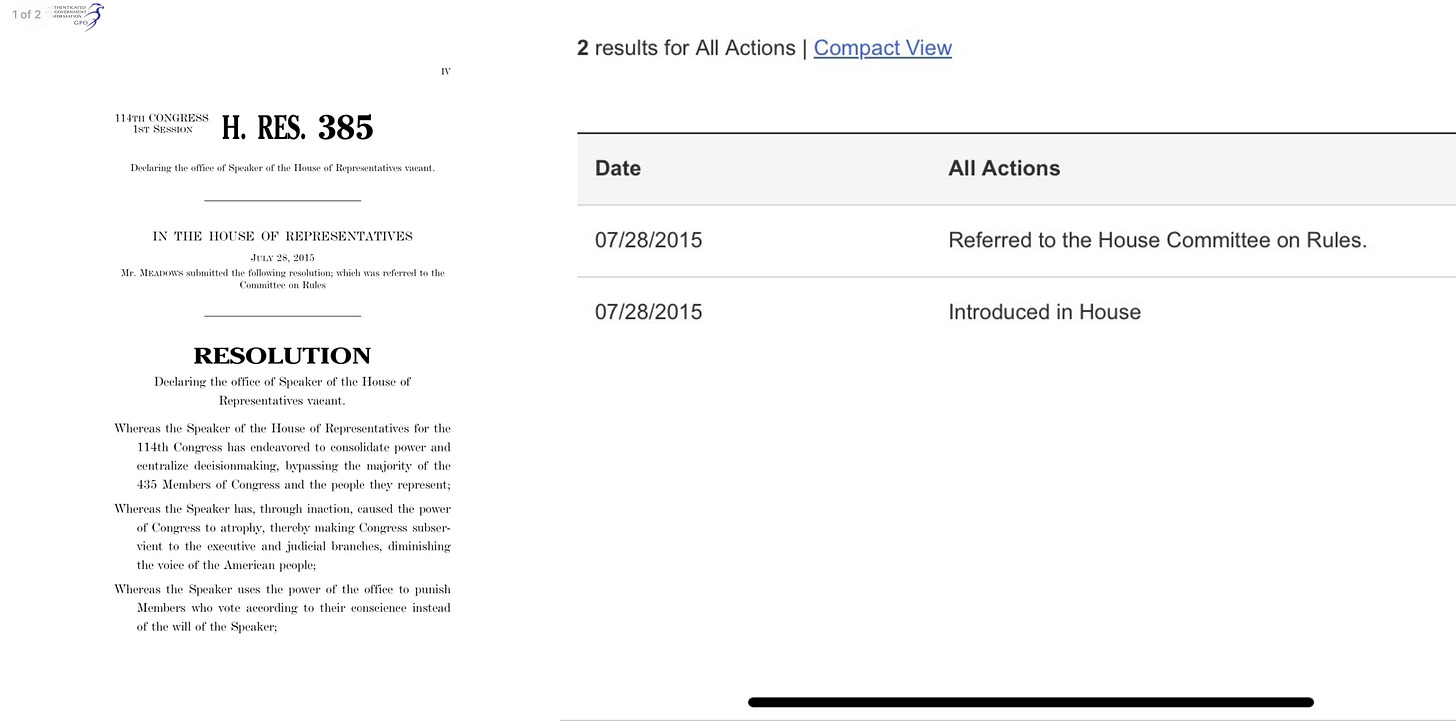


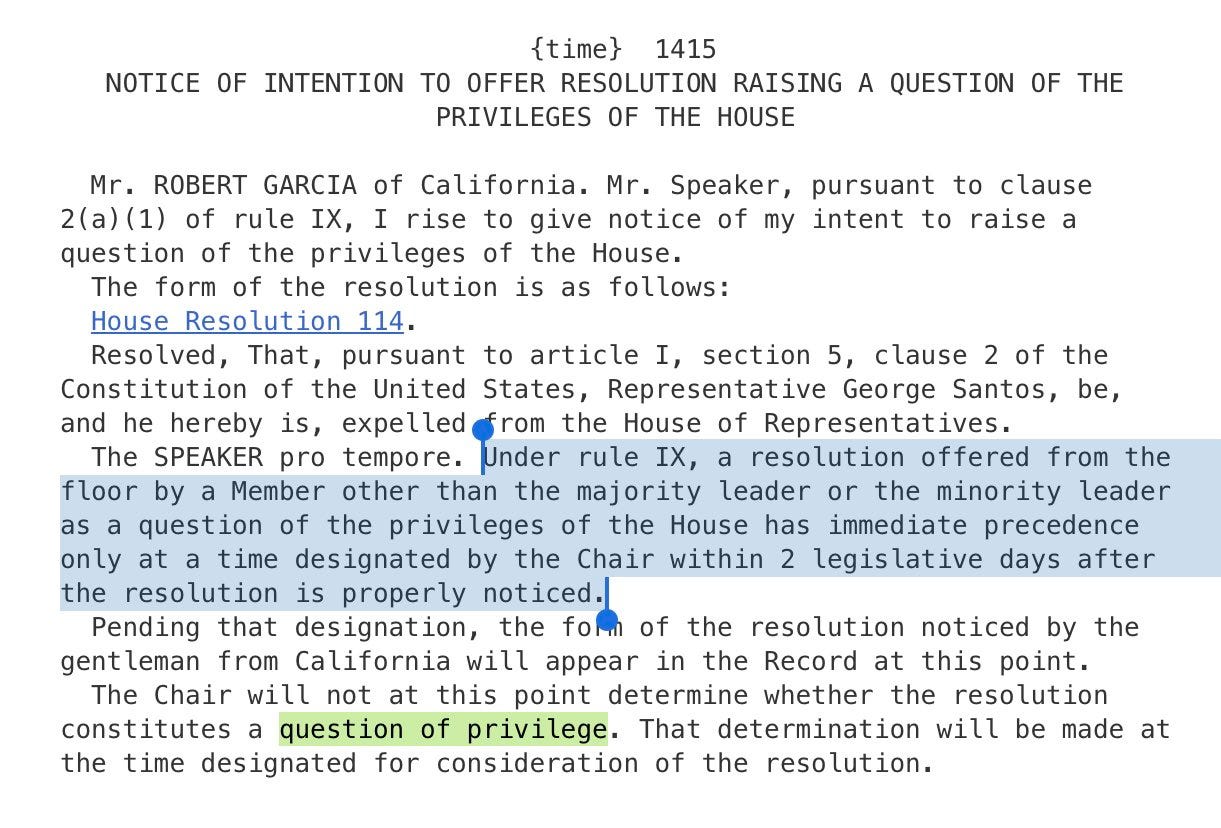
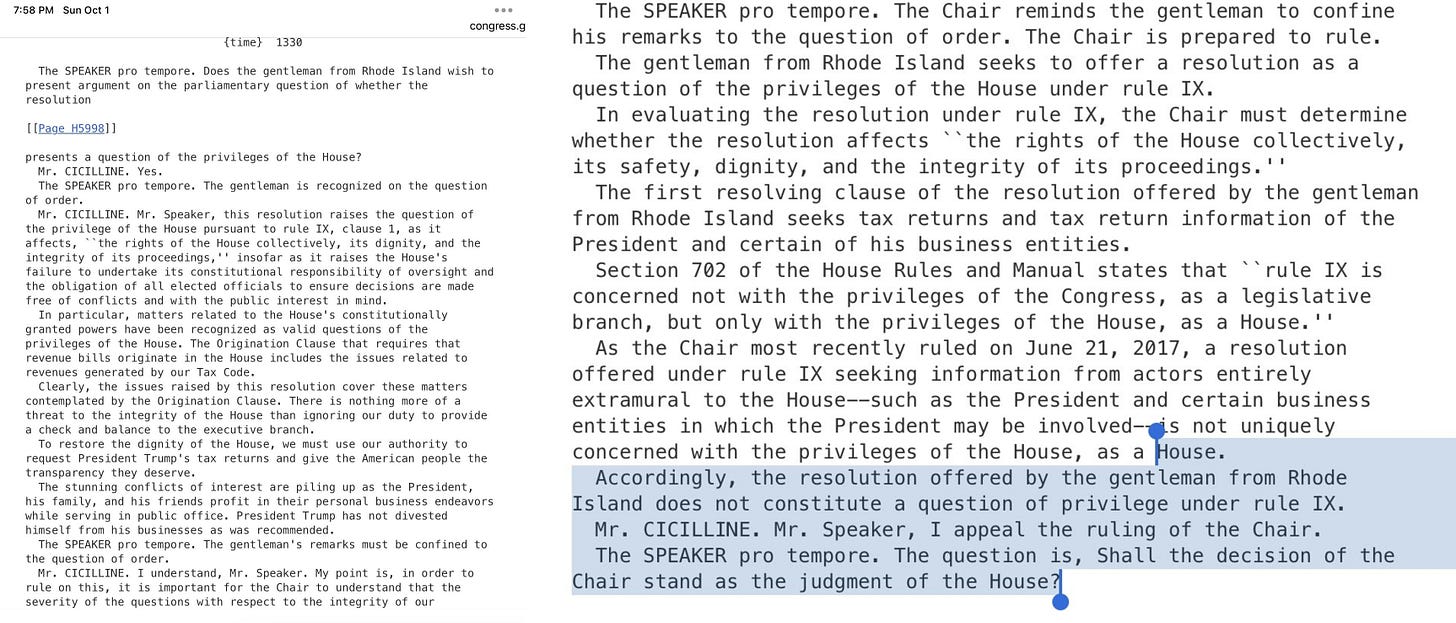


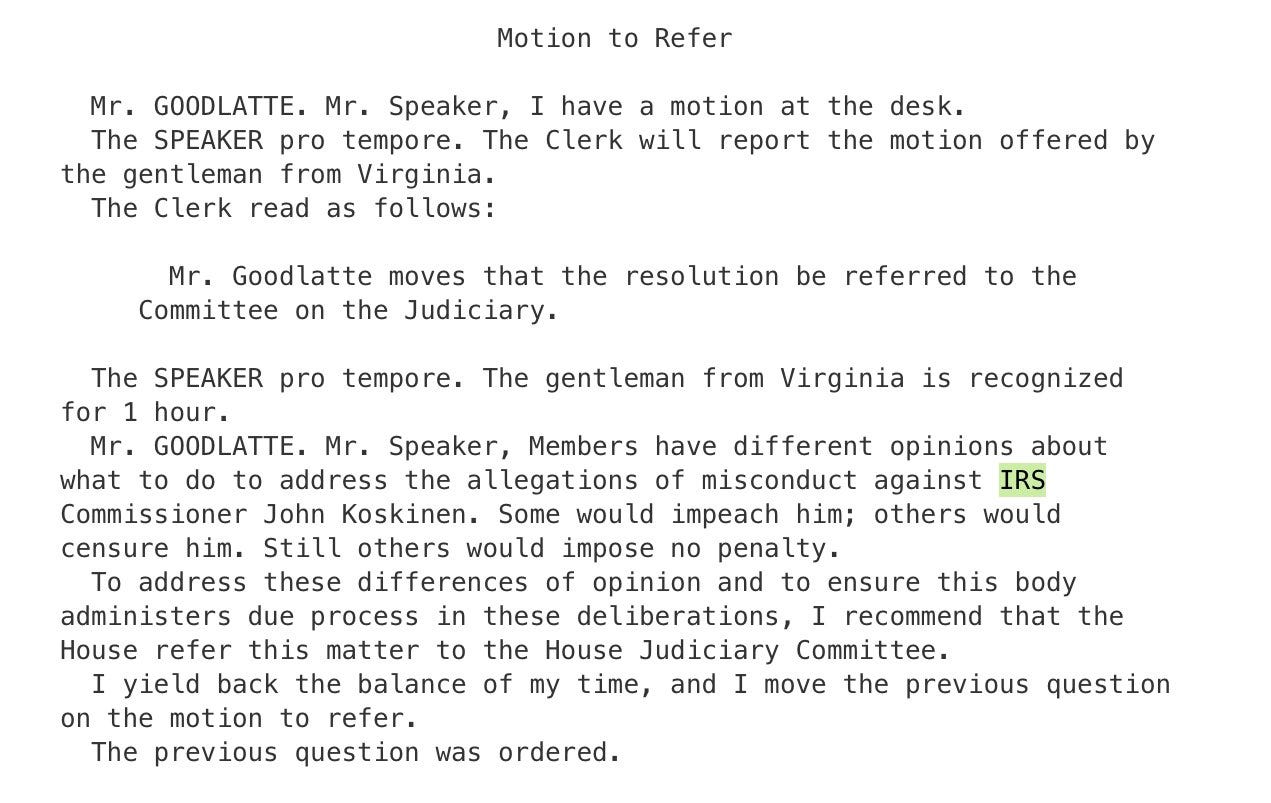
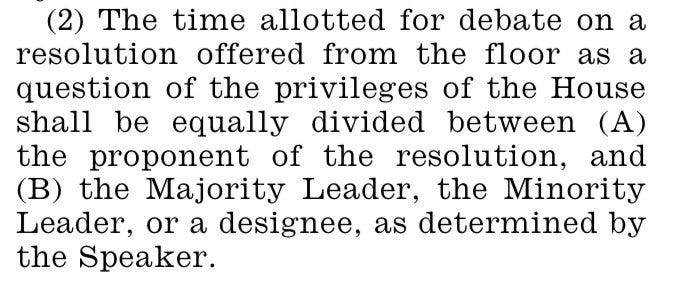

Thanks for doing this Matt, it was a big help.
A couple of typos:
> that would move policy dramatically to the right and alienate more of his current GOP supporters
To the left, right? To the Dems' position?
> is almost an idea result
"ideal"
>But Gaetz has an equally challenging math problem, in that he needs to make sure that virtually the entire Democratic caucus continues to reflexively vote against McCarthy on procedural issues.
The sentence is repeated twice (first in non-bold, then in bold).
Also, now we do know this:
> Who is the top name on the list that McCarthy gave to the Clerk? We don’t know!